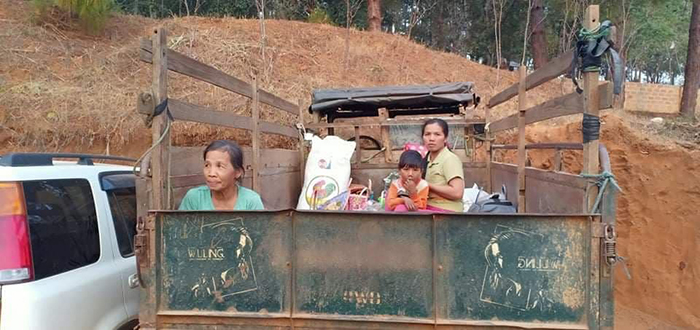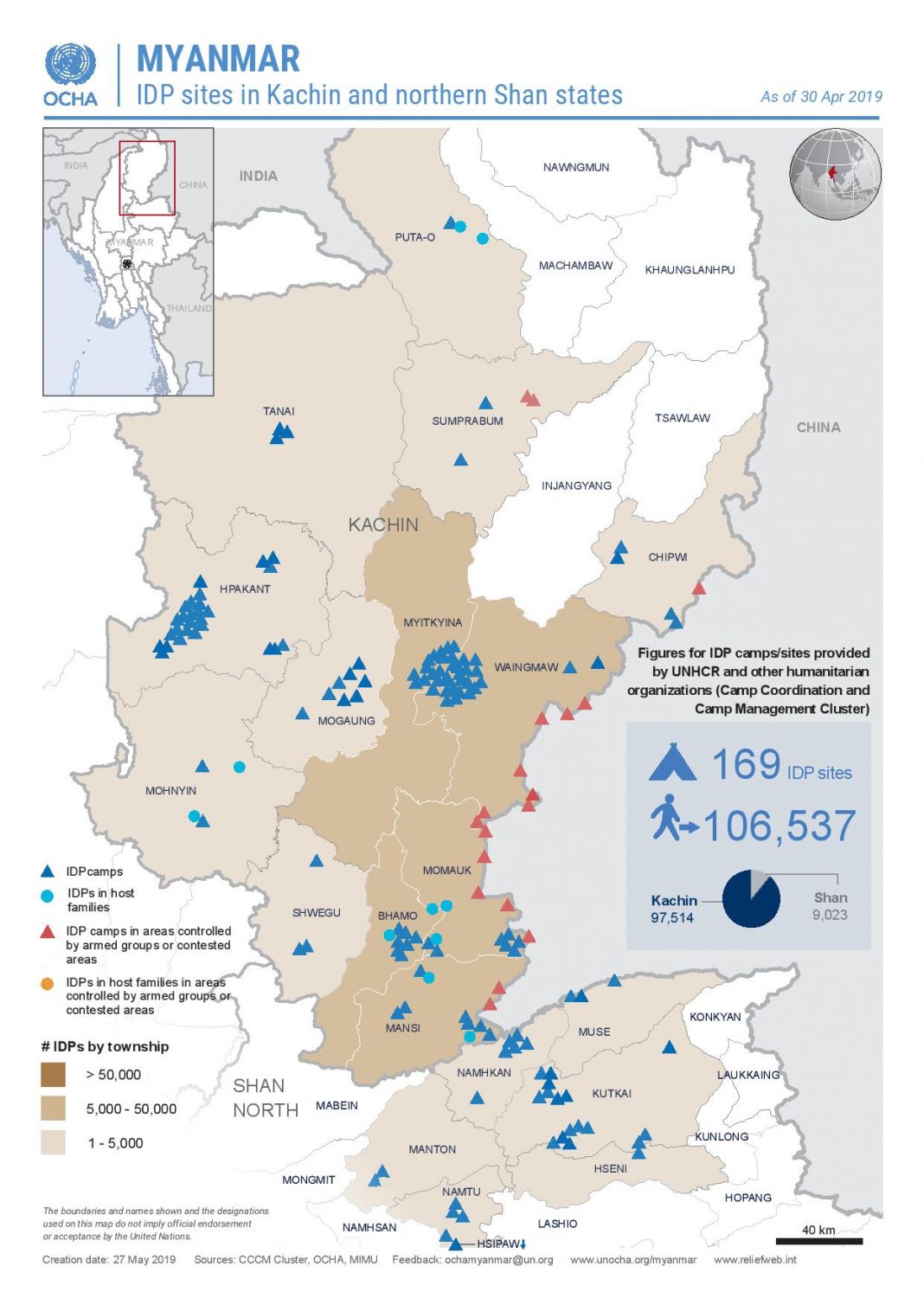Very recently, on March 14, a video podcast was uploaded on Facebook by a NGO group “Land in Our Hands” with the title of “Sorrowful voices of northern Shan State and Kachin State IDPs”.

Prior to this, Transnational Institute (TNI), based in The Hague, published a collection of various participants report held in Lashio, norther Shan State, titled: “No Camp Closure Without Restitution” on March 11, outlining the plight of the IDP as a “perfect storm”, which is the combination of the 2018 Virgin Fallow and Vacant (VFV) Land Management Law, the Belt and Road Initiative (BRI), and the National internally displace person (IDP) Camp Closure Strategy.
It writes: “The current government’s plan for camp closure without restitution legitimizes and reinforces the VFV law and ratifies many land grabs that have already taken place, many of which are being consolidated under the Belt and Road Initiative (BRI). IDP land return without restituting the previous socio-economic and agroecological social order is surest way to prevent IDPs from reclaiming their land.”
“Without an immediate social justice-oriented restitution, IDPs land, labor, lives and livelihoods risk being subsumed by the marginalizing currents of the BRI,” warned the highly critical opinion piece.
But to understand the March 11, 2019 VFV Land Management Law land registration deadline, which is now one year old, it is necessary to look back at the past decades of land grabbing in Kachin and Shan states.
Accordingly, in the 1980s-1990s the big business of jade mining, mineral mining, teak logging, and livestock breeding started devastating the land and resources, which was followed by the Shwe Li hydro-power project in 1997, utilizing land for the project itself, including also more land all around Shwe Li. Big infrastructure and more extraction projects followed, using big machines that wrecked existing village infrastructures that were built by the locals.

In the 2000s, came the big agribusiness land concessions for various kinds of plantation agriculture (rubber, banana, sugarcane), as well as more big infrastructure projects like the railway.
“The government, armed groups, immigration officials, local authorities, local militias all cooperated with especially Chinese investors to grab our lands for agriculture projects. This also led to eventual Chinese domination of business activities in many of our areas. We lost control of more of our lands. And as agriculture plantations expanded, the businessmen also introduced foreign seeds and step by step villagers in agribusiness-affected areas stopped using the local seeds,” writes the TNI opinion piece.
By June 2011, seventeen years of ceasefire that the KIA signed with the then military junta State Law and Order Restoration Council (SLORC) broke down and the war continues until today, turning the population into IDPs. And by 2016 , the word “BRI” was heard without the locals having any concrete idea of the projects involved.
The TNI report writes: “In one consult I heard they came in and said a project going on was approved and they will do it, so they are just letting the community know. Not really a consultation, but just letting us know.”
The implementation of the VFV Management Law of 2012 as Amended by The Law Amending the Vacant, Fallow and Virgin Lands Management Law of 2018 on September 11, which came into effect on 11 March 2019, is supposed to harmonize the various land laws, according to the National Land Use Policy (NLUP). But it has just done the opposite and in the process of implementation it is harming the marginalized ethnic farmers than actually protecting them.
According to it, detailed information on the extent and use of land together with the Form 7 (rights to work the land permit) have to be submitted by 11 March 2019, which largely hasn’t been unable to follow suit by the IDPs due to lack of national registration cards and inability to file submission because of bureaucratic hurdles conducted in Burmese language alien to most ethnic nationalities.
And if the applications are rejected, they will be served summary eviction notices without having the right to appeal. Further, if convicted a maximum penalty of two years imprisonment and a fine of 500,00 Kyats can be fined.
“The current government laws, policies, programs and projects are in effect legalizing resource grabbing activities that have gone on before and up until now to dispossess us of our lands, forests, waters and social life and heritage. There is no recognition of customary rights, there is no law giving protection for our local systems. There are only laws that legalize all that has been taken from us while our lives have been frozen in IDP camps,” the TNI report pointed out correctly.

Portraying the disappointment and helplessness, the report writes: “There seems to be a growing push for the lands of IDPs to be reallocated to others. Why? It seems that in the eyes of the Myanmar elite, and in the light of BRI agenda, ‘economic development’ means that our lands are needed, but we are not. Yet maybe for reasons of appearances (legitimacy), the way now to achieve this is through application of ‘rule of law’, specifically the VFV Land Law.”
According to Myanmar Ministry of Information in December 2019, there are more than 140 displaced persons camps, with a total population of more than 160,000 in 15 townships in four states. The ministry said that it is important to determine the plan and policy to close the displaced persons camps, and work procedures need to be setup so that the closing of the camps can be conducted based upon international norms, and international cooperation as required.
On January 6, a national-level policy discussion on the resettlement of Kachin IDPs and the closure of IDP camps were held in Myitkyina, Kachin State, where Dr. Win Myat Aye, the union minister of social relief and resettlement was present at the meeting representing the government.
While members of the Burmese government insist that closures will happen “in line with international norms,” those working with IDPs are concerned about the circumstances to which displaced communities would return.
Gam Seng, who is a charge of the Catholic IDP camp in Mai Na in Myitkyina, said that IDPs were worried about reclaiming back the land that they left behind.
“Our people have faced many difficulties regarding land ownership in remote areas because many people don’t have land ownership documents. What we want is for their land ownership to be approved with recommendations from their neighbors,” Gam Seng told Kachin News Group.
While there were some repatriation pilot projects being carried out by the Tatmadaw and government, without the consent of the Kachin Independence Organization, in Kachin State, large scale return of the IDPs is not possible for two reasons. One is the guarantee that there must be a durable peace so that the IDPs could return and the other, the guaranteed restitution with regards to their land ownership, without which they won’t be able to exist in the long run.
In practical terms, if the IDPs said if they were to return, the military should not be in the villages, nor should they be anywhere present in the surrounding areas and in between the villages, which the EAOs should also do likewise. If the two sides can guarantee that they won’t fight, then they would surely go back, which should be in a form of bilateral agreement. In addition, an agreement with IDP communities should also be made.
But the key point is realizing the land restitution policy of the IDPs by the government, which should also see to it that illegitimate investment are taken out and removed, which have destroyed or damaged the IDPs’ homes, farms, forests, waters, village infrastructures and village social life.
It is by all means a tall order and the government, as well as all the stakeholders are duty-bound to right the wrong for the IDPs who have to endure years of sufferings due to the civil war which is not their own making. But first the bilateral ceasefire between the Northern Alliance – Burma, which is made up of Arakan Army, Kachin Independence Army, Myanmar National Democratic Army and Ta’ang National Liberation Army, and the Tatmadaw will have to be in place. And only then the repatriation and land restitution of the IDPs countrywide could follow and resolve the problem in a holistic and comprehensive manner.












Leave a Comments